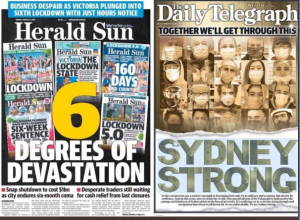In defence of Twitter

Herald Sun, The Daily Telegraph
In a recent article, Leigh Sales, the host of the ABC’s 7.30, said bullying on Twitter has become unhinged and that Twitter is not remotely representative of the Australian public.
It’s not difficult to agree with some of her points. Some users on Twitter are cruel, reckless, pointless and wild. They give us the creeps. They inflict pain and by their own words they condemn themselves.
Cruelty is a feature of social media. And Leigh Sales has not been singled out. Yassmin Abdel-Magied, for example, was brutally set upon after she posted about Anzac Day. The algorithms that drive traffic privilege the extreme and the incandescent, privilege the reptilian brain. The machine feeds on the worst of our own selves so the divide between thought incompetent and Tweet uncivilised becomes perilously thin.
The question then becomes how should individuals and organisations comport themselves on social media? Is deleting an account and withdrawing from the field a way to properly manage psychic threats and risks?
Twitter is not just the preserve of the vicious. Not all users of Twitter are ‘sewer rats’ in the words of Nine journalist, Chris Uhlmann.
And a difference exists between bullying and criticism.
Which means we can simultaneously support Leigh Sales as she calls out the yowlers yet reject her depiction of Twitter as being a place of bullying and harassment orchestrated by ‘politicians’ acolytes, lackeys, fans and proxies, mostly – but not always – operating anonymously.’
Sensible users of Twitter know that it fills a void. Its reach, immediacy and depth – its community of experts – provide access to the finest minds in the world. For example, for those of us who are not climate scientists, Twitter gives us access to the insights of Dr Michael Mann, who certainly is. We have access to his thinking about how the fossil fuel sector is now adopting a set of tactics, first perfected by Big Tobacco, to delay action on climate change.
Apart from access to the world’s finest thinkers, Twitter provides us with content that often makes our heart sing. Close encounters, whales hugging paddle boarders, dogs, children, cats, kittens, monkeys, an infinite number of parrots and Australian birds.
Users post notes of thanks; acts of random kindness and gentleness occur.
Twitter unfolds a world that would otherwise remain hidden to our eyes. We are exposed to thoughts and ideas we would have never considered, to parallel universes of which we would have remained ignorant.
Programs like 7.30 do not do this with any frequency – they do something of course but they cannot sustain the intensity, pace, breadth, depth or interpretive rigor of the Twitter community.
Twitter provides a fact-checking mechanism that is immediate, hyper-aware and sensitive. For the first time in history, because of Twitter, we can, for example, examine the coverage of COVID-19 by media outlets in real time, and compare the treatment given to different governments, different premiers and different states.
This is something new. To this point in time, the power relationship has been clear: journalists have opined and readers or viewers have respectfully consumed.
Now, things are different. Consumption continues, but subservience does not.
Many Australians, some of whom use Twitter, consider that our media does not act in good faith. They do not trust Leigh Sales and her colleagues in the fourth estate to be fair, fearless or balanced and they are no longer prepared to be servile.
Leigh Sales may well believe that her own words on the role of the journalist – ‘to question, no matter the stripe of the legislator or the justness of the cause in which freedoms are removed’ – represent standard practice in Australian journalism.
Some, however, perceive a huge gulf between principle and practice, and they use Twitter to comment on the evidence before their eyes. In doing so, very often their comments are partisan and tough-minded and critical. In doing so, they bring evidence and insights that are not obvious to non-specialists, as well as intelligence and passion.
Thank goodness.
For Leigh Sales the best course of action as a user of Twitter is also the easiest. The best response to criticism is easy. Block the idiots. Engage with the rest.

